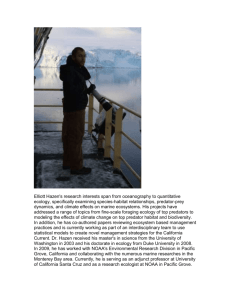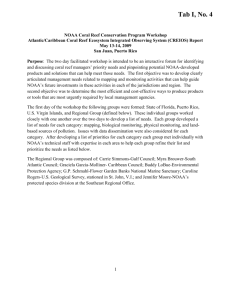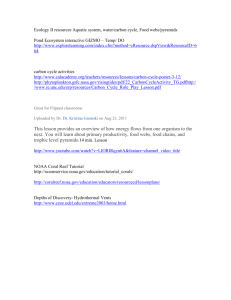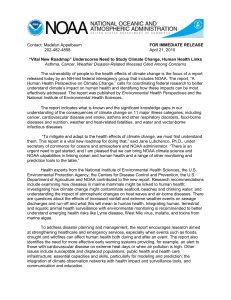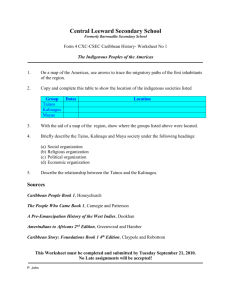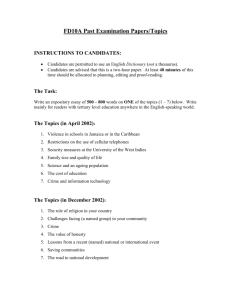Institute Courses are continued from 10:30 am, except for one
advertisement
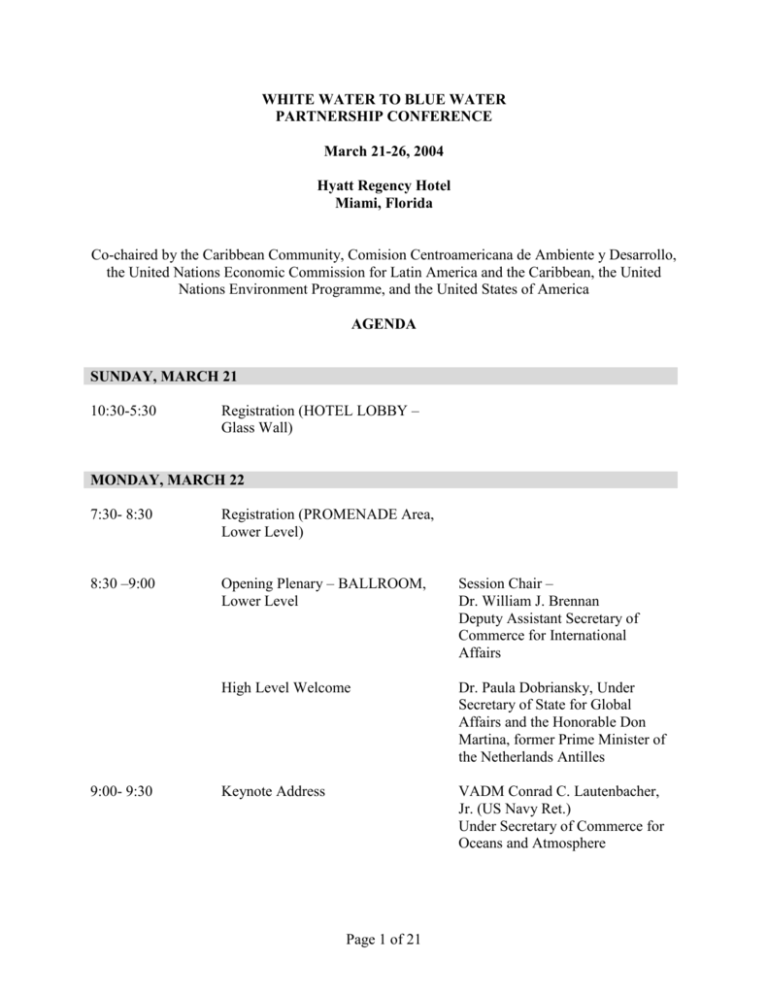
WHITE WATER TO BLUE WATER PARTNERSHIP CONFERENCE March 21-26, 2004 Hyatt Regency Hotel Miami, Florida Co-chaired by the Caribbean Community, Comision Centroamericana de Ambiente y Desarrollo, the United Nations Economic Commission for Latin America and the Caribbean, the United Nations Environment Programme, and the United States of America AGENDA SUNDAY, MARCH 21 10:30-5:30 Registration (HOTEL LOBBY – Glass Wall) MONDAY, MARCH 22 7:30- 8:30 Registration (PROMENADE Area, Lower Level) 8:30 –9:00 Opening Plenary – BALLROOM, Lower Level Session Chair – Dr. William J. Brennan Deputy Assistant Secretary of Commerce for International Affairs High Level Welcome Dr. Paula Dobriansky, Under Secretary of State for Global Affairs and the Honorable Don Martina, former Prime Minister of the Netherlands Antilles Keynote Address VADM Conrad C. Lautenbacher, Jr. (US Navy Ret.) Under Secretary of Commerce for Oceans and Atmosphere 9:00- 9:30 Page 1 of 21 9:30-10:30 Plenary Session: Governance - The Keystone of Integrated Management Organized by USAID and The World Bank -- Jacqueline E. Schafer, Deputy Assistant Administrator for the Bureau of Economic Growth, Agriculture and Trade, U.S. Agency for International Development -- Franklin McDonald, Chief Executive Officer, National Environment and Planning Agency, Jamaica -- Exequiel Ezcurra, President, Instituto Nacional de Ecologica, Mexico -- Miriam Brandao, Foundation Representative, Inter-American Foundation 10:30-11:00 Coffee/Tea 11:00-12:00 Panel on Small Island Developing States and The International Coral Reef Initiative -- Diane Quarless, Chief, Small Island Developing States Unit Division for Sustainable Development UN/ECOSOC -- John Roberts, Head of Marine Environment and Inland Waters Division, DEFRA, United Kingdom -- Arthur Rolle, Meteorologist, Bahamas -- Judith Garland-Campbell, Project Manager, Coastal Resource Management Project, Turks and Caicos 12:00-12:30 Plenary Session on Integrated Watershed Management Session Co-Chairs: Vincent Sweeney, Caribbean Environmental Health Institute (CEHI) and Tom Crow, US Department of Agriculture Facilitator: Elizabeth McLanahan, NOAA Speaker #1 Mr. Navin Chandarpal Advisor to the President of Guyana on Sustainable Development Speaker #2 L. Michael Szendrey Vice President, Bacardi Corporation 12:30-2:00 Lunch Speaker: Benjamin Grumbles, Acting Assistant Administrator for Water, US Environmental Protection Agency (USEPA) 2:00 – 3:30 Watershed Breakout Sessions and Institute Sessions: Page 2 of 21 BRICKELL ROOM ORCHID ROOM B 1. Community Participation in Integrated Watershed Management 5. Conservation Planning at Different Resource Levels: Areawide, Regional, Site-Specific (including an example from the Mississippi River Basin) – Matthew Judy, Bill Boyd, Thomas Crow, USDA - Pilot Projects to Engage Stakeholders in Integrated Watershed Management StrategiesEd Kruse, NOAA - Restoring reefs and rural livelihoods/Coral Gardens InitiativeAngelica Shamerina, Counterpart International and Susan Mahon, Counterpart Caribbean - Engaging Stakeholders in Reef Monitoring to Enhance Reef Management - Laddie Akins, Reef Environmental Education Foundation (REEF) - Local Action Strategies - Roger Griffis, NOAA and Ernesto Diaz, Puerto Rico DNER FLAGLER ROOM ORCHID ROOM C 2. A Caribbean Sea Observing System: Developing Tools for Regional Marine Resource Management 6. Integrated Watershed Management Common goals of IOCARIBEGOOS and WW2BW, including examples of IOCARIBE-GOOS implementation partnerships and an open forum with regional leaders – Doug Wilson and Rick Spinrad, NOAA Page 3 of 21 - An integrated approach to managing the marine, coastal and watershed resources of east-central Portland, Jamaica – Thera Edwards, NEPA - Industrial Waste Minimization in the Low Haina River Basin, Dominican Republic – Ministry of Environment and Natural Resources - An Integrated Approach for the Management and Protection of the St. Michael Groundwater Unit and Coastal Area, Barbados – John Mwansa MONROE ROOM ORCHID ROOM D 3. Promoting IWM and research to foster sustainable development 7. Clean Water Revolving Fund – Nick Shufro, PricewaterhouseCoopers - The International Hydrological Programme (IHP-UNESCO): Latin America and the Caribbean RegionMaria Donoso, Victor Pochat and Basil Fernandez, UNESCO - Promoting improved management strategies at the Land-Water Interface (LWI) – Chris Mees, MRAG Ltd. - Caribbean Agrochemicals Management Project (CAMP): Promoting an Holistic Approach to Agrochemical Management in the Caribbean – Chris Mees, MRAG Ltd. and Vincent Sweeney, CEHI Page 4 of 21 TUTTLE ROOM 4. Governance #1: Principles and Practices of Sound Governance- Richard Volk, USAID - Stephen Olsen, University of Rhode Island/Coastal Resources Center - Karen McDonald-Gayle, USAID Jamaica - Sergio Claure, USAID Panama - Marilyn Dieguez, Panama Canal Authority - Shaun Paul, Ecologic - Miriam Brandao, Inter-American Foundation Institute Courses will run Concurrently with Breakout Sessions (please refer to the course schedule provided in Conference Welcome Kits for descriptions and times; all courses will be held on the third floor of the hotel in the rooms indicated ) Stanford – Planning a Successful Mooring Program: Mooring Buoy Installation and Maintenance Zamora – Economic Analysis for Environmental Decisions: An Overview for Natural Resource Managers President’s – Managing Coastal Ecosystems for Sustainable Coastal Tourism: A Barbados Example Board – Sustainability of Large Marine Ecosystems Johnson I – When You Can’t Use the Past to Predict the Future: Examples from the Travels of Caribbean Marine Organisms Johnson II – Coastal and Marine Oil Spill Response in Tropical Environments 3:30-4:00 Coffee/Tea 4:00-5:30 Watershed Breakout Sessions and Institute Sessions: BRICKELL ROOM HIBISCUS A 1. Partnering to Restore Wetlands - A Collaborative Approach to Implementing the Ramsar Convention in the Americas – Margarita Astralaga, Ramsar Page 5 of 21 6. Adapting the NOAA Sea Grant model of linked Applied Research, Extension and Education to the Wider Caribbean Region – - Rene Eppi, NOAA - The Caddo Lake Initiative: Building a Wetlands Network in the Western Hemisphere - Dr. Eric W. Gustafson, US-Mexico Chamber of Commerce - Dr. Roy Darville, East Texas Baptist University - Stephen Olsen, University of Rhode Island (URI) - Barry Costa Pierce, URI Sea Grant - International Corporate Wetlands Restoration Project: Public-Private Funding Cooperation – George Olson, The Gillette Company FLAGLER ROOM HIBISCUS B 2. Village-Led Watershed Management Methodology for the Western Caribbean Basin - Moderator- Shaun Paul, EcoLogic Development Fund 7. Overview/Assessment of National Programmes of Action: Experiences in Development and Opportunities for Partnerships to Develop New Ones - An effective strategy for scaling community-based watershed management for park buffer zone conservation - Gerardo Rodriguez, Pico Bonito National Park Foundation – Overview of National Program of Action (NPA) to Implement Land Based Sources Protocol - David Osborn, UNEP/GPA - Village-led watershed management and payment for ecosystem services in Mesoamerica - Sebastian Charchalac, EcoLogic Development Fund - Overview of NOAA’s initiative to promote NPAs in the Wider Caribbean - Ed Kruse and Clement Lewsey, NOAA MONROE ROOM - Facilitated discussion of opportunities to forge new partnerships – Gonzalo Cid and Ed Kruse, NOAA ORCHID D 3. Non-point Source Pollution 8. Sewage -Agroforestry designs for managing non-point source pollution from agriculture and communities – - Greg Ruark, USDA - Bonaire sewage system and treatment plant – Peter Montanus, Bonaire Dept. of Physical Planning and Management - Unique Agroforestry Solutions for - Marina Waste Management at Page 6 of 21 Controlling Non-Point Source Pollution in Wet Tropical Areas - Bryon Griffith, USEPA - Ligia Ramos, Dole - Marion Dodson & Alex Salinas, FUNAVID - Guillermo Valle, Universidad Nacional Autonoma de Honduras– Curla TUTTLE ROOM Elizabeth Harbor, Bahamas – Rochelle Newbold, Best Commission, Ministry of Health and Environment 4. Governance #2: Linking Governance with Sustainable Financing- David Hess, USAID - Scott Smith, Conservation Finance Alliance and The Nature Conservancy (TNC) - Stefano Pagiola, The World Bank - Alison Eskesen, USAID 9. Integrated Ecosystem Management: Community Based Approach Using Systems Analysis and Simulation Modeling – ORCHID C ORCHID B 5. Linking Land-based Sources of Pollution with Coastal Ecosystems 10. No Adverse Impacts: A New Directive for Floodplain Management – Pam Pogue, Association of State Flood Plain Managers - Reefs at Risk in the Caribbean – Lauretta Burke and Jon Maidens, World Resources International (WRI) - Land-use planning and watershed restoration in the Courland Watershed and Buccoo Reef, Trinidad and Tobago – Owen Day, Buccoo Reef Trust FLAMINGO - Terri Morgan, Partnership For The Environment - W.E. Grant, Texas A&M University * Institute Courses are continued from 2:00 pm 5:30-6:30 Country Team Meetings JASMINE/PROMENDADE/RIVER WALK 6:30-8:00 Welcome Reception – JASMINE - Hosted by Under Secretary of State Page 7 of 21 for Global Affairs Paula Dobriansky - Sponsored by The Gillette Company - Announcement of the International Corporate Wetlands Restoration Partnership Note for Tuesday: Two-Page Descriptions of Partnerships Under Discussion on Tuesday Will Be Available at the Back of JASMINE by 4:00 p.m. TUESDAY, MARCH 23 8:30-9:30 Plenary Session: Reports on Emerging Partnerships CHAIR: Joth Singh, Executive Director, Caribbean Conservation Association Announcement of the UWI Coastal Management Research Network (COMARE Net). A regional network of the University of the West Indies' Office of Research, funded by the United Kingdom DFID Natural Resources Systems Programme Presentation of UNEP/NOAA Global Programme of Action (GPA) Partnership - Veerle Vandeweerd, UNEP-GPA and William J. Brennan, NOAA Announcement of the partnership between UN-FAO, Organizacion del Sector Pesquero y Acuicola del Istmo Centroamericano (OSPESCA), and the Swedish International Development Cooperation Agency (SIDA): Partnership for Improvement of Interdisciplinary Fisheries Research for Responsible Fisheries in Central American Countries 9:30-10:30 Plenary Session on Marine Ecosystem-based Management Session Chairs: - Al Duda, GEF - Robin Mahon, UWI -Ken Sherman, NOAA Facilitator: Nancy Daves, NOAA Speaker #1 Dr. Leonard Nurse, Former Permanent Secretary, Ministry of the Environment, Barbados Governance Speaker #2 Dr. Robin Mahon, Dr. Caribbean Large Marine Page 8 of 21 Ken Sherman Ecosystem (LME) Project 10:30-11:00 Coffee/Tea 11:00-12:30 Marine Breakout Sessions and Institute Sessions: BRICKELL ORCHID B 1. Fisheries Governance – Robin Mahon, UWI/CERMES FLAGLER 2. MPA Network – Bob Glazer, Gulf and Caribbean Fisheries Institute (GCFI) and Georgina Bustamante, TNC MONROE 3. Binational Partnership in Coastal Ocean Observing Systems Development: the Harmful Algal Bloom Observing System Pilot (HABSOS) – - Bryon Griffith, USEPA - Russ Beard, NOAA - Juan Manuel Irogoyen, Papaloapan Development Council 5. Educating for a Sustainable Future – Karen Eckert, WIDECAST ORCHID C 6. Collaborations for Marine Science in Latin America and the Caribbean - PATOMAC and other paradigms – Kevin Leaman, University of Miami/Rosenstiel School of Marine and Atmospheric Sciences (RSMAS) ORCHID D 7. Productivity and Other Indicators – William Richards and Ken Sherman, NOAA Fisheries TUTTLE 4. Socio-economic aspects of marine ecosystems – Patrick McConney, UWI/CERMES Courses will begin at 10:30 Institute Courses will run Concurrently with Breakout Sessions (please refer to the course schedule provided in Conference Welcome Kits for descriptions and times; all courses will be held on the third floor of the hotel in the rooms indicated) Page 9 of 21 Stanford – Integrating Watershed and Marine Ecosystem Management into Cross-Sectoral Sustainability Education Zamora – Preserving and Using Freshwater Sustainably: How to Effectively Engage the Tourism Industry President’s – Improvement of Quality of Life, Erosion Control and Water Conservation Using Sustainable Agroforestry Systems in the Wet and Dry Tropics of Honduras Board – Drafting International Maritime Organization (IMO) Submissions for Ship Routing and Reporting Systems Johnson I – Introduction to Geographic Information Systems and Applications for Sustainable Water Management Johnson II – Coastal and Marine Oil Spill Response in Tropical Environments (CONTINUED) 12:30-2:00 Lunch Speaker: Mr. Arthur Gray, UN-ECLAC Note: Deadline to Sign Up for the Wednesday Night Dinner/Social Event at UMiami’s Rosenstiel School of Marine and Atmospheric Sciences on Virginia Key. Please sign up and obtain tickets at the University of Miami or SeaKeepers booths on the Promenade Level. 2:00 - 3:30 Marine Breakout Sessions and Institute Sessions: BRICKELL ORCHID B 1. Fisheries Governance – Robin Mahon, UWI/CERMES FLAGLER 2. Part 1 of 2: Financing MPAs – Paul Hoetjes, Netherlands Antilles 5. Educating for a Sustainable Future – Karen Eckert, WIDECAST ORCHID C MONROE 6. Developing a Research Agenda for the Caribbean – Michael McClain, Florida International University (FIU) ORCHID D 3. Pollution and Ecosystem Health: Key Indicators Used to Measure the Condition of Coastal Ecosystems – Kevin Summers, USEPA 7.Modernization of Institutional and Legal Frameworks in Water Resources Systems – Emilio Sempris, CATHALAC - Ocean Governance: Blue Water Legal and Institutional Frameworks - Francois Bailet, IOI Page 10 of 21 TUTTLE 4. Socio-Economic Aspects of Marine Ecosystems – Patrick McConney, UWI/CERMES * Institute Courses are continued from 10:30 am, except for one: Board – Observing Systems 3:30-4:00 Coffee/Tea 4:00-5:30 Marine Breakout Sessions and Institute Sessions: BRICKELL ORCHID C 1. Finding Assistance in Marine Law Enforcement – - Michele Kuruc/Paul Raymond, NOAA - John Gavitt, WildAid 6. Introduction to GLOBE: Involving Caribbean Students in Watershed Management – - Luis Roberto Acosta, Mexico GLOBE Representative - Henry Saunders, Trinidad & Tobago GLOBE Coordinator - Dr. Hudson Roditi, GLOBE Regional Director for Latin America FLAGLER HIBISCUS A 2. Part 2 of 2: Financing MPAs – Paul Hoetjes, Netherlands Antilles MONROE 7. Best Practices for Donors and Recipients in the Caribbean - Rebecca Cerroni, Wildlife Conservation Society (WCS) - Brennan Van Dyke, UNEP Regional Office for North America HIBISCUS B 3. Pollution and Ecosystem Health Wrap-up – Bryon Griffith and Kevin Summers, USEPA 8. Building Community Leadership in Coastal Zone Management - Scaling successful approaches to coastal zone community leadership in Mesoamerica - Shaun Paul, EcoLogic Development Fund Page 11 of 21 - A Community-based Approach to Binational Coastal Zone and Protected Area Management in Belize and Guatemala - Gregorio Ch'oc, Sarstoon Temash Institute for Indigenous Management - People and Coral; People and Mangroves - Joth Singh, CCA TUTTLE 4. Caribbean LME Project – Ken Sherman, NOAA Fisheries ORCHID B 5. Marine Animal Stranding Network – Janet Whaley, NOAA Fisheries * Institute Courses are continued from 2:00 pm 5:30-6:30 Country Team Meetings JASMINE/PROMENADES/RIVER WALK 6:30-7:30 Matchmaking Social with a Focus on GPA-related Partnerships JASMINE/PROMENADES/RIVER WALK Note for Wednesday: Two-Page Descriptions of Partnerships Under Discussion on Wednesday Will Be Available at the Back of JASMINE by 4:00 p.m. WEDNESDAY, MARCH 24 8:30-9:30 9:30-10:30 Plenary Session - Reports on Emerging Partnerships CHAIR: Dr. Patricio Bernal, IOC Presentation of WW2BW Website-Caribbean Environment Programme Luc St-Pierre, UNEP CAR/RCU Plenary Session on Environmentally Sound Marine Transportation (ESMT) Chairs: Claudia Grant, Maritime Authority of Jamaica and Rod Zika, International SeaKeepers Society/ University of Miami Facilitator: Lindy Johnson, NOAA Page 12 of 21 Speaker #1 Dr. Sylvia Earle, Conservation International Speaker #2 Rear Admiral Peter Brady, Director General of the Maritime Authority of Jamaica 10:30-11:00 Coffee/Tea 11:00-12:30 ESMT Breakout Sessions and Institute Sessions: BRICKELL ORCHID B 1. Ships’ Ballast Water and Harmful Aquatic Organisms and Pathogens – Kathy Metcalf, Chamber of Shipping 5. No Anchoring Areas: An IMO Designation – Lindy Johnson, NOAA FLAGLER ORCHID C 2. The Power of Hydrography I: 6. Donor Forum – Veerle Environmental Uses of Hydrography Vandeweerd, UNEP-GPA – Meg Danley, NOAA MONROE 3. Bilateral Spill Response Agreements – Patrick Keane, USCG TUTTLE 4. Ship-Generated Waste Reception Facilities – Claudia Grant, Maritime Authority of Jamaica Courses will begin at 10:30 Institute Courses will run Concurrently with Breakout Sessions (please refer to the course schedule provided in Conference Welcome Kits for descriptions and times; all courses will be held on the third floor of the hotel in the rooms indicated ) Page 13 of 21 Stanford – Hydrologic Role of Agroforestry Practices as Integral Components of Watershed Management in Central America Zamora – Financial Mechanisms for Freshwater Preservation: How to Encourage Environmental Service Payments President’s – Integrated Water Resources Management Board – Advanced Scientific Visualization of Marine Science Problems in the Caribbean Johnson I – Climate Change Adaptation and Natural Hazard Mitigation Johnson II – Socioeconomic Monitoring Guidelines for Coastal Managers in the Caribbean Foster I: Proven Methods to Develop Effective and Lasting MultiSectoral Partnerships 12:30-2:00 Lunch 2:00-3:30 ESMT Breakout Sessions and Institute Sessions: BRICKELL ORCHID B 1. Anchors Away! - A Mooring Buoy Partnership Program – - Joe Schittone, NOAA - Pat Cotter, USEPA FLAGLER 5. The Power of Hydrography II: Making It Work for You – Meg Danley, NOAA 2. Cruise Ship Initiative – Dave Balton, U.S. Department of State 6. Best Practices for Donors and Recipients in the Caribbean - Rebecca Cerroni, Wildlife Conservation Society (WCS) - Brennan Van Dyke, UNEP Regional Office for North America MONROE 3. RAC/REMPEITC-CARIB (Oil Spill Regional Activity Center) Partnerships – Rick Rodriguez, USCG TUTTLE 4. Marine Antifoulants and the Clean and Green Ships Initiative I: Environmental Risks and Regulation – Bryan Wood-Thomas, USEPA Page 14 of 21 ORCHID C * Institute Courses are continued from 10:30 am, except for two: Board: Benthic Coral Reef Monitoring Approaches Foster I: Metodos Comprobados para Desarrollar Alianzas Multisectoriales Efectivas y Durables 2:00-4:00 3:30-4:00 Coffee/Tea 4:00-5:30 ESMT Breakout Sessions and Institute Sessions: BRICKELL ORCHID C 1. International SeaKeepers Society: Caribbean Partnership Program – Rod Zika, International SeaKeepers Society FLAGLER 6. Anchors Away! A Mooring Buoy Partnership Program – - Joe Schittone, NOAA - Pat Cotter, USEPA ORCHID D 2. Cruise Ships, Kids, and Science – - Peggy Finarelli, GLOBE - Richard Pruitt, Royal Caribbean Cruises Ltd. (RCCL) - Liz Williams, UMiami/RSMAS - Lisa Pitman, RSMAS MONROE 7. Marine Antifoulants and the Clean and Green Ships Initiative II: Innovations in the Market – Bryan Wood-Thomas, USEPA 3. Particularly Sensitive Sea Areas: An IMO Designation – Lindy Johnson, NOAA TUTTLE 4. Environmentally Sound Boating and Marinas: The Good Mate/Clean Marinas Partnership – - Charles Barr, The Ocean Conservancy (TOC) - Javier Velez-Arocho, USEPA ORCHID B 10. 5. A Case Study of Regional Project Implementation in Marine Science – Gary Vigers, Canadian International Development Agency (CIDA) * Institute Courses are continued from 2 pm Page 15 of 21 5:30 HOTEL FRONT ENTRANCE Busses Depart for the RSMAS/SeaKeepers Dinner Social On Virginia Key Busses will run continuously until 8:30 Note for Thursday: Two-Page Descriptions of Partnerships Under Discussion on Thursday Will Be Available at the Back of JASMINE by 4:00 p.m. THURSDAY, MARCH 25 8:30-9:30 Plenary Reports on Partnerships CHAIR: Nelson Andrade Colmenares, Coordinator, UNEP-CAR/RCU 9:30-10:30 Plenary Session on Sustainable Tourism Co-Chairs: Cecil Miller, Organization of American States (OAS) and Mercedes Silva, Caribbean Tourism Organization (CTO) Facilitator: Elaine Denning, NOAA Bruce Potter, Island Resources Foundation Sustainable Tourism: Findings and Priorities 10:30-11:00 Coffee/Tea 11:00-12:30 Sustainable Tourism Breakout Sessions and Institute Sessions: BRICKELL ORCHID B 1. Integrated Tourism Planning Partnership – June Marie Mow Robinson, ECOASTUR 5. Conservation of Protected Species through Ecotourism – - Karen Eckert, WIDECAST - Raquel Seybert, TNC FLAGLER ORCHID C 2. Tour Operators for Sustainable Destinations – Giulia Carbone, UNEP 6. Best Practices for Donors and Recipients in the Caribbean – - Rebecca Cerroni, WCS Page 16 of 21 - Brennan Van Dyke, UNEP MONROE 3. Charting A Course: An International Congress for Coral Reef Protection from Ship-based Tourism – - Cecil Miller, OAS - Ross Klein, Memorial University of Newfoundland - Jeff Benoit, Travel Just - Howard Breen, Travel Just - Jackie Savitz, Oceana TUTTLE 4. Eco-Monitoring and Assessment Consortium for Advancing Monitoring of Ecosystem Sustainability in the Americas – Sidney Draggan, EPA Caribbean Sea Ecological Assessment - Joth Singh, CCA Courses will begin at 10:30 Institute Courses will run Concurrently with Breakout Sessions (please refer to the course schedule provided in Conference Welcome Kits for descriptions and times; all courses will be held on the third floor of the hotel in the rooms indicated ) Stanford – Emergency Management Using the Incident Command System (ICS) Zamora – Reef Check President’s – Sea Grant 101: Experience with Research, Extension, and Education Board – The Way Forward Towards Sustainable Wastewater Management in Coastal Cities Johnson I – Climate Change Adaptation and Natural Hazard Mitigation (CONTINUED) Johnson II – Establishing and Managing a Natural Resource Damage Assessment Regime: Legal, Technical, and Practical Considerations Foster I: Los Métodos exitosos para la Administración de la Línea Divisoria de las aguas de Comunidad-Basó 12:30-2:00 Lunch Page 17 of 21 2:00 – 3:30 Sustainable Tourism Breakout Sessions and Institute Sessions: BRICKELL ORCHID C 1. Part 1 of 2: Beaches and Marinas – Certification and Environmental Management – - Mercedes Silva, CTO - Henry Salas, PAHO - Ava Reich, FIU - Allan Williams, University of Glamorgan - Walter McLeod, Clean Beaches Council (CBC) FLAGLER 5. Yachting Sector in Selected Caribbean Countries - Erik Blommestein, ECLAC 2. Practical Tools Supporting Sustainable Hotel Development and Marine Tourism – Sarah Raposa, Conservation International MONROE 3. Multi-Stakeholder Dialogue and National Action Plans for Responsible Tourism - Chris Tompkins, United Kingdom/ DEFRA TUTTLE 4. Part 1 of 2 - Climate Adaptation Projects Introduction - Clement Lewsey, NOAA - Neville Trotz, Regional Climate Change Center - Emilio Sempris, CATHALAC Institute Courses will run Concurrently with Breakout Sessions Page 18 of 21 Stanford – Participatory Approaches for Rural Development: Stakeholder Participation from Problem Specification and Priority Setting to Solutions Zamora – Western Atlantic Coral Diseases President’s – Safe Use and Disposal of Antifouling Paints and Wastes Board – Coral Reef Marine Protected Areas: What is Good for Conservationists is Also Good for the Business Sector Johnson I – Climate Change Adaptation and Natural Hazard Mitigation (CONTINUED) Johnson II – Establishing and Managing a Natural Resource Damage Assessment Regime: Legal, Technical, and Practical Considerations (CONTINUED) Foster I: Los Métodos exitosos para la Administración de la Línea Divisoria de las aguas de Comunidad-Basó (REPETIDO) 2:004:00 3:30-4:00 Coffee/Tea 4:00-5:30 Sustainable Tourism Breakout Sessions and Institute Sessions: BRICKELL ORCHID C 1. Part 2 of 2: Hotels and Industry Certification and Best Practices – Deirdre Shurland, Caribbean Alliance for Sustainable Tourism (CAST) FLAGLER 2. Promoting Collaboration Among NGOs in the Wider Caribbean: Next Steps to Implement Partnerships Identified in WW2BW – IUCN, CCA and CATHALAC MONROE 3. Golf Course Environmental Practices – Mit Parsons, USDA TUTTLE 4. Geographic Technologies in Water Management: Model Programs for Research, Outreach and Education – - Patricia Solis, American Page 19 of 21 6. Marine Science Wrap-Up Kevin Leaman, RSMAS and Doug Wilson, NOAA Association of Geographers (AAG) - Rodrigo Tarte, International Center for Sustainable Development (CIDES) - Lauretta Burke, WRI - Terri Morgan, PFE - Ligia Castro, CATHALAC ORCHID B 5. Part 2 of 2 - Climate Adaptation Projects Synergies - Neville Trotz, Regional Climate Change Center - Emilio Sempris, CATHALAC * Institute Courses are continued from 2 pm, except for one: Board: Funding Your Conservation Project 5:30-6:30 Country Team Meetings JASMINE/PROMENADES/RIVER WALK 6:30-7:30 Matchmaking Social JASMINE/PROMENADES/RIVER WALK FRIDAY, MARCH 26 8:30-10:00 Plenary Session on Emerging Sustainable Tourism Partnerships CHAIR: Deirdre Shurland, CAST 10:00-10:45 Coffee/Tea 10:45-12:00 Concluding Plenary Page 20 of 21 Session Chair – Dr. William J. Brennan Deputy Assistant Secretary of Commerce for International Affairs The final session will include a meeting summary, and affords the opportunity for new partnership announcements Franklin McDonald, Jamaica, Chris Tompkins, UK and WW2BW Thematic Co-Chairs Sustainable Development Institute – Len Hirsh, Smithsonian Institution Conference Closing Remarks – John F. Turner, Assistant Secretary of State for Oceans, International Environmental and Scientific Affairs Conference Concludes 12:30-2:00 Lunch Page 21 of 21
